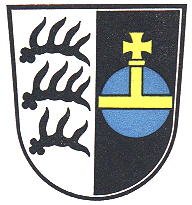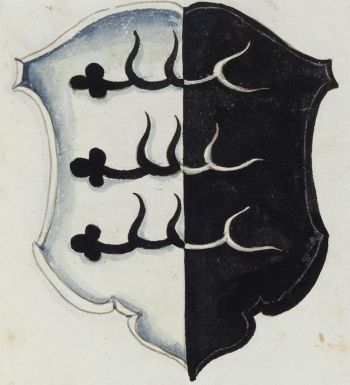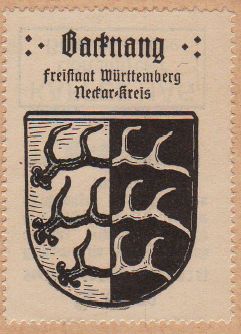Backnang: Difference between revisions
Knorrepoes (talk | contribs) m (Text replacement - ". ===Origin/meaning===" to ". |- |'''English''' | {{blazon wanted}} |} ===Origin/meaning=== ") |
Knorrepoes (talk | contribs) m (Text replacement - "===Origin/meaning=== The" to "===Origin/meaning=== The") |
||
| Line 21: | Line 21: | ||
===Origin/meaning=== | ===Origin/meaning=== | ||
The oldest seal of the city, dating from the early 14<sup>th</sup> century, shows a single eagle. In 1324 the town became part of Württemberg and soon thereafter the three deer antlers appeared. At first the antlers were in the proper colours (black on gold) , but in the 16th or 17<sup>th</sup> century the colours were changed. This was probably done to avoid confusion with the arms of Württemberg. | The oldest seal of the city, dating from the early 14<sup>th</sup> century, shows a single eagle. In 1324 the town became part of Württemberg and soon thereafter the three deer antlers appeared. At first the antlers were in the proper colours (black on gold) , but in the 16th or 17<sup>th</sup> century the colours were changed. This was probably done to avoid confusion with the arms of Württemberg. | ||
The right part of the shield is probably derived from the arms of the St. Pancratius monastery in the town. | The right part of the shield is probably derived from the arms of the St. Pancratius monastery in the town. | ||
Revision as of 06:10, 18 July 2022
This page is part of the German heraldry portal Deutsche Wappensammlung |
Heraldry of the World |
|
German heraldry:
|
Selected collector's items from Germany:
|
BACKNANG
State : Baden-Württemberg
District (Kreis) : Rems-Murr Kreis (until 1972 Backnang)
Additions : 1936: Unterweissach; 1941 Steinbach; 1971 Maubach; 1972 Heiningen, Strümpfelbach, Waldrems
| German |
In gespaltenem Schild vorne in Silber drei liegende schwarze Hirschstange übereinander, hinten in Schwarz ein blauer Reichsapfel mit goldenem Beschläg und Kreuz. |
| English | No blazon/translation known. Please click here to send your (heraldic !) blazon or translation |
Origin/meaning
The oldest seal of the city, dating from the early 14th century, shows a single eagle. In 1324 the town became part of Württemberg and soon thereafter the three deer antlers appeared. At first the antlers were in the proper colours (black on gold) , but in the 16th or 17th century the colours were changed. This was probably done to avoid confusion with the arms of Württemberg. The right part of the shield is probably derived from the arms of the St. Pancratius monastery in the town.
| The arms in the Chorographia Württemberg (Wolleber, 1591) |
The arms by Hupp in the Kaffee Hag albums +/- 1925 |
Contact and Support
Partners:
Your logo here ?
Contact us
© since 1995, Heraldry of the World, Ralf Hartemink 
Index of the site
Literature : Stadler, 1964-1971, 8 volumes.














